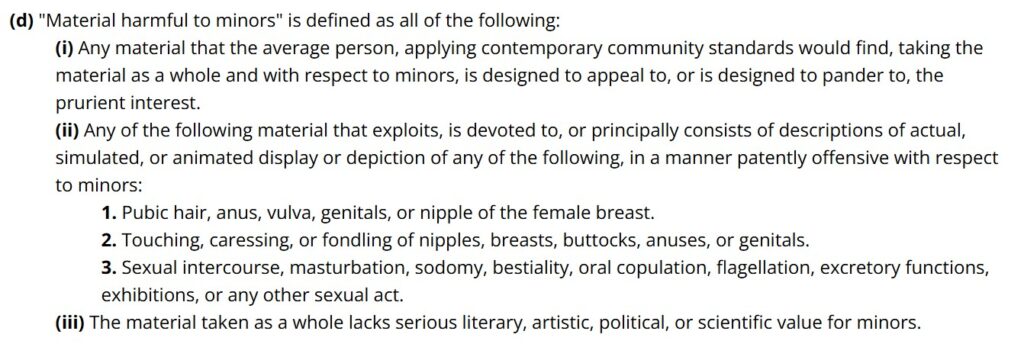In the last few months, headlines have been filled with stories about states “cracking down” on social media in the name of protecting children. At first glance, these laws sound like common sense. But when you dig deeper, a troubling truth emerges: these bills don’t actually put power back in the hands of parents, they give more control to government bureaucrats and Big Tech.
The Mississippi Case
Last week, Justice Kavanaugh issued an opinion on a controversial law passed in Mississippi in 2024. Mississippi’s Online Safety Act (HB 1126) is one of the strictest attempts yet to regulate children’s access to social media. The law requires minors to obtain parental consent before creating accounts on major social media platforms. It also places obligations on tech companies to verify the age of users and block access to explicit or “harmful material” (see image below). Supporters argue that the law is a necessary safeguard in an era of rising concerns about teen mental health, cyberbullying, and online predators.

But almost immediately after the law was signed in 2024, it faced stiff legal challenges. Civil liberties groups and technology companies sued, claiming that HB 1126 violates the First Amendment by restricting free expression and access to information. A federal district court initially sided with them, blocking the law from taking effect and warning that it placed unconstitutional burdens on both minors and the companies that host online platforms.
Then in April 2025, the Fifth Circuit Court of Appeals overturned the district court’s injunction, allowing Mississippi’s law to move forward. That decision marked a turning point in the broader national debate, as it suggested that states may indeed have the authority to limit minors’ use of online platforms in the name of child safety. On August 14, 2025, Justice Brett Kavanaugh, concurring in the denial of NetChoice’s request for emergency relief, acknowledged that under existing precedent, NetChoice was likely to win on the merits. He wrote:
“NetChoice has, in my view, demonstrated that it is likely to succeed on the merits—namely, that enforcement of the Mississippi law would likely violate its members’ First Amendment rights… In short, under this Court’s case law as it currently stands, the Mississippi law is likely unconstitutional.”
The law remains in effect because the Court wasn’t persuaded that NetChoice had shown “the balance of harms and equities” justified blocking the law right now. Mississippi parents will see this law enforced while the longer legal battle plays out, even as the Court signals that, ultimately, the law may not survive constitutional scrutiny. Many parents in Mississippi see this as a win for “parental rights”, but is it really or is it the government dictating how parents “parent?”
State Laws Sweeping the Country
Take a look at some of the “social media safety” legislation that has been proposed and/or passed in recent years around the country.
- Florida (HB 3, 2024): One of the strictest laws in the country, it bans social media accounts for children under 14 and requires parental permission for teens aged 14–15. Platforms must delete accounts if discovered.
- Utah (2023): The Social Media Regulation Act requires parental consent for minors, enforces curfews, and gives parents access to their child’s accounts. Enforcement is still tangled in court challenges.
- New York (2024): The SAFE for Kids Act restricts addictive features like endless scrolling and push notifications for minors, and the Child Data Protection Act limits how platforms collect children’s data.
- Maryland (2024): Passed its own version of an Age-Appropriate Design Code, modeled after California’s, requiring platforms to tailor services and default settings for minors.
- Washington State (SB 5708, 2024): This bill claims to enhance “transparency,” but in reality, it requires platforms to notify minors when parents attempt to monitor them. Instead of empowering parents, it puts children in the driver’s seat of oversight.
Each of these laws markets itself as a solution for protecting kids. But are they really?
Who Actually Benefits from These Laws?
These laws are sold as “protecting children” and “upholding parental rights”, but are children and parents really the ones winning here?
- Big Tech
These companies can absorb the costs of compliance. They already have teams of lawyers and engineers who can design age-verification systems and content filters. Smaller competitors, however, get squeezed out—consolidating Big Tech’s monopoly power. - Government Bureaucrats
Every law creates new regulatory authority. Agencies gain power to define “appropriate content,” set “safety standards,” and punish platforms that don’t comply. Once those levers exist, they can easily expand into areas that have nothing to do with child safety. - Lawyers and Lobbyists
These bills open the floodgates for lawsuits—parents suing platforms, states suing companies, companies suing states. Who wins? The attorneys billing by the hour, not families trying to protect kids. - Politicians
Let’s be honest: these bills are also political cover. Lawmakers get to campaign on “protecting children” while avoiding the harder conversations about culture, parenting, and responsibility.
Meanwhile, parents and kids are left with less authority, less choice, and fewer alternatives. These laws don’t hand power to parents, they put the authority to regulate in the hands of government and Big Tech.
Why Legislation Isn’t the Answer
The truth is, no government program or tech mandate can replace the role of parents. Laws that sound like they’re protecting kids usually create loopholes, new risks, or simply shift the responsibility from families to bureaucracies. They do not address the root problem: children need strong, present parents who teach them how to live in a digital world. Instead of handing our power to parent over to the government, we need to empower parents with the tools and support they need to say no to social media with no guardrails and put strong boundaries in place for their children.
How Parents Can Take Back Control
If legislation won’t save our kids, what will? Parents stepping up.

- Delay the smartphone. Children don’t need unlimited access to the internet in their pockets.
- Use tools you control—not Big Tech’s defaults. Consider router-based filters or third-party parental controls rather than trusting platforms to police themselves.
- Teach digital literacy. Kids need to understand how algorithms work, how predators operate, and how these platforms are designed to be addictive.
- Stay connected. Family dinners, screen-free time, and open conversations build resilience against online dangers.
- Lead by example. Kids mirror what they see. If parents are glued to their devices, kids will be too.
The Bottom Line
From Mississippi to Washington, statehouses are full of lawmakers pushing bills that promise to protect children online. But the real beneficiaries are Big Tech, government bureaucrats, and politicians—not families.
True protection doesn’t come from handing more power to government or corporations. It comes from parents reclaiming their rightful authority in the home.
If we want to raise strong, healthy kids in the digital age, we can’t outsource the job. We must take it back—ourselves.
Parents should raise kids—not government or Big Tech. Help us fight back. As a grassroots 501(c)(4), we rely on your support.


